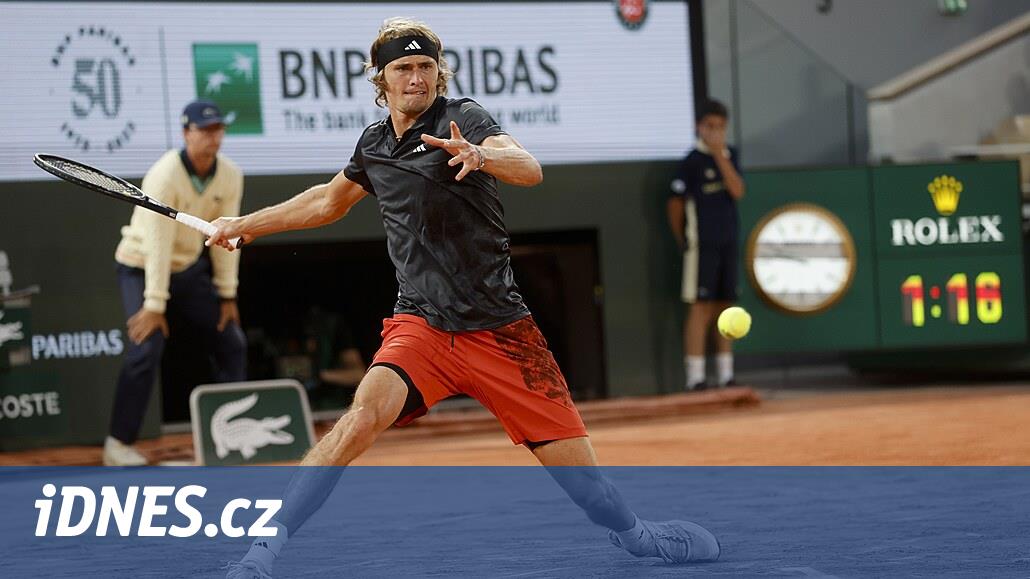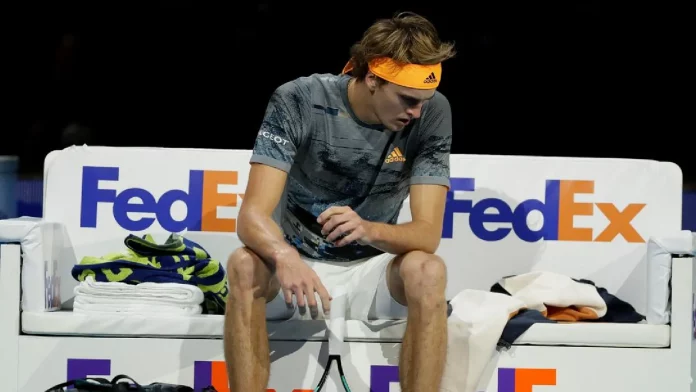Why Does Zverev Inject Himself? Unpacking Athlete Health And Public Curiosity
Have you ever wondered about the intense physical demands placed on top athletes, especially in a sport as grueling as tennis? It's a world where bodies are pushed to their limits, day in and day out, with very little rest. So, when questions pop up, like "Why does Zverev inject himself?", it's almost natural for people to be curious. Fans, you know, really care about their favorite players and what keeps them going on the court. This kind of question, in a way, often comes from a place of genuine concern about an athlete's well-being or perhaps just a bit of wonder about how they manage to stay at the top of their game.
The truth is, professional sports involve a lot of unseen effort and care behind the scenes. Athletes, pretty much like anyone else, can face injuries, require medical support, or need specific treatments to keep their bodies performing at peak levels. Understanding this broader context can help make sense of why such questions might arise. It’s a very demanding career, after all, and staying fit is their job.
This article will look into the general topic of athlete health, the kinds of legitimate medical procedures they might get, and how important transparency is in sports. We'll also touch upon why these questions, specifically "Why does Zverev inject himself?", sometimes circulate and how we can approach them with a clear head. We want to clear up any misunderstandings, you see, and give you a better idea of the facts surrounding top-level sports and player well-being.
- Tiffany Henyard Previous Offices
- Shawn Killinger Husband Joe Carretta
- August Moon
- Hayley Atwell Nude
- Sexy Anime Girls
Table of Contents
- Alexander Zverev: A Look at the Tennis Star
- The Rigors of Professional Tennis and Athlete Health
- Legitimate Medical Treatments for Athletes
- Anti-Doping Measures in Tennis
- Addressing the Question: Why Does Zverev Inject Himself?
- Frequently Asked Questions
- Final Thoughts on Athlete Well-being
Alexander Zverev: A Look at the Tennis Star
Alexander Zverev, often called "Sascha," is a well-known figure in the world of men's professional tennis. He's from Germany and has been a significant presence on the ATP Tour for quite a while now. He's known for his powerful serve and strong groundstrokes, which, you know, really make him a tough opponent on any court. He has achieved some pretty big things in his career, including winning gold at the Tokyo Olympics in 2020 and reaching a Grand Slam final. His journey in tennis has been one of consistent effort and, sometimes, overcoming big challenges.
Like many top athletes, Zverev has faced his share of physical demands and, you know, the usual wear and tear that comes with playing at such a high level. There was, for example, a serious ankle injury he had at the French Open in 2022, which kept him off the court for a good amount of time. Recovering from such an injury often involves a lot of medical care and, naturally, a careful rehabilitation process. It's a very long road back to full fitness for any player.
Personal Details and Bio Data
| Detail | Information |
|---|---|
| Full Name | Alexander Zverev |
| Nationality | German |
| Born | April 20, 1997 |
| Birthplace | Hamburg, Germany |
| Height | 1.98 m (6 ft 6 in) |
| Plays | Right-handed (two-handed backhand) |
| Professional Debut | 2013 |
| Career Highlights | Olympic Gold Medalist (2020 Tokyo), ATP Finals Champion (2018, 2021), US Open Finalist (2020) |
The Rigors of Professional Tennis and Athlete Health
Professional tennis is, in a way, a test of endurance and physical toughness. Players travel around the globe, competing on different surfaces, often in various weather conditions, and sometimes playing multiple matches in a single week. This kind of schedule puts a tremendous amount of stress on their bodies. So, it's pretty common for athletes to deal with injuries, whether they are sudden accidents or, you know, the kind that build up over time from repeated movements.
Things like muscle strains, joint issues, and even stress fractures are, sadly, not uncommon. To keep playing at an elite level, athletes need to manage these physical challenges very carefully. This usually means having access to top-notch medical teams, including doctors, physical therapists, and trainers. They all work together, you see, to help players stay healthy and recover from any setbacks.
The goal is always to prevent injuries where possible, treat them quickly when they happen, and then get the player back to their best form safely. It's a constant balancing act between pushing the body to its limits and, in some respects, giving it the proper care and rest it needs. This is why discussions about athlete health are so important, as it helps us understand the realities of their demanding careers.
Legitimate Medical Treatments for Athletes
When an athlete faces an injury or needs help with recovery, there are many legitimate medical treatments available. These treatments are often part of a standard care plan designed to help them heal and get back to competition. For example, some common approaches include physical therapy, specific exercises to strengthen weakened areas, and, you know, sometimes even minor procedures to help with pain or inflammation. It's all about helping the body repair itself.
In some cases, a doctor might suggest injections as part of a treatment plan. These could be, for instance, corticosteroid injections to reduce swelling in a joint, or perhaps hyaluronic acid injections to help with joint lubrication. Platelet-rich plasma (PRP) therapy, which uses a patient's own blood components to speed up healing, is also a treatment that some athletes receive. These are, basically, medical interventions aimed at recovery, not performance enhancement.
It's important to remember that any medical treatment given to an athlete, especially one involving injections, would typically be administered by qualified medical professionals. They follow strict guidelines and, you know, prioritize the athlete's long-term health. These kinds of treatments are a very standard part of sports medicine, designed to help athletes manage pain, recover from injuries, and maintain their physical well-being over a long career.
Anti-Doping Measures in Tennis
Professional tennis has very strict anti-doping rules in place, overseen by organizations like the International Tennis Federation (ITF) and the World Anti-Doping Agency (WADA). These rules are there to make sure that the sport is fair and that all players are competing on an equal footing. So, every athlete, including Alexander Zverev, is subject to regular drug testing, both during competitions and, you know, often when they are not competing at all. This system is designed to catch anyone trying to gain an unfair advantage.
Players must report their whereabouts so that testers can find them for out-of-competition tests. If a player needs to use a substance that is on the prohibited list for a legitimate medical reason, they must apply for a Therapeutic Use Exemption (TUE). This is a formal process where doctors review the need for the substance and, basically, grant permission if it's truly necessary for health and not for performance. It's a way to balance player health with the integrity of the sport.
The anti-doping system is quite robust, and any violation can lead to serious consequences, including long bans from the sport. This strong framework means that any claims about athletes using prohibited substances without official approval are taken very seriously and, you know, require clear evidence. The goal is to keep the sport clean, for everyone involved, and that's a very important part of professional tennis today.
Addressing the Question: Why Does Zverev Inject Himself?
When a question like "Why does Zverev inject himself?" comes up, it's natural to wonder about its origin. There is, to be clear, no publicly available, credible information or official reports suggesting that Alexander Zverev has engaged in any unauthorized or illicit injections for performance enhancement. In fact, if there were any such concerns, the anti-doping authorities in tennis would investigate them thoroughly, and any findings would typically be made public, you know, as part of their transparency efforts. As of today, there has been no such announcement regarding Zverev.
It's possible that such questions arise from general curiosity about athlete health, or perhaps from misunderstandings about legitimate medical treatments. As we've discussed, athletes do sometimes receive injections for entirely valid medical reasons, like treating an injury or managing chronic pain. These are, basically, part of standard medical care in sports. Without specific, verified information from official sources, it's really important not to jump to conclusions or spread rumors.
Public figures, especially athletes, often face intense scrutiny, and sometimes, you know, questions or rumors can circulate without any factual basis. For reliable information about a player's health or any medical procedures, it's always best to refer to official statements from the player, their team, or the relevant sports authorities. Any other information is, arguably, just speculation. The most important thing is to rely on facts, especially when it comes to a player's well-being and their standing in the sport.
Frequently Asked Questions
Do tennis players use injections?
Yes, tennis players, like other athletes, might receive injections as part of legitimate medical treatments. These could be for managing pain from injuries, reducing inflammation, or helping with recovery after a physical setback. These are, you know, usually administered by medical professionals and are not for performance enhancement. If a substance is prohibited, they need a special exemption.
What kind of medical treatments do athletes get?
Athletes get a wide range of medical treatments to stay healthy and recover from injuries. This includes physical therapy, rehabilitation exercises, massage, ice baths, and, yes, sometimes injections. They might also use specific diets and recovery protocols. The goal is, basically, to keep their bodies in top condition and help them heal when they get hurt. It's a very comprehensive approach to health.
Is Zverev facing doping allegations?
As of today, and you know, looking at all the public records, Alexander Zverev is not facing any doping allegations from official anti-doping organizations in tennis. He is subject to the same strict testing protocols as all other professional players. Any claims about doping without official confirmation are, you know, just rumors. It's really important to rely on verified information from credible sources, like the ATP or ITF, for such serious matters.
Final Thoughts on Athlete Well-being
The lives of professional athletes are, in some respects, a constant balancing act of intense training, competition, and careful recovery. Questions like "Why does Zverev inject himself?" highlight the public's keen interest in their health and performance. It's good to remember that athletes, just like all of us, can face health challenges and require medical support. They often rely on a team of medical experts to help them stay fit and deal with injuries. This support, you know, is all part of keeping them playing at their best.
The world of professional sports, especially tennis, has very clear rules and regulations, particularly concerning anti-doping measures. These systems are there to make sure that competition is fair and that players are healthy. So, when we hear questions about an athlete's health or treatment, it's always best to look for facts from official sources and, you know, avoid speculation. Understanding the legitimate aspects of athlete care helps us appreciate the dedication and hard work these individuals put into their careers, and that's pretty much what it's all about.
For more general information about athlete health and sports medicine, you can look up resources from reputable sports organizations, like the International Tennis Federation's anti-doping program. You can learn more about athlete wellness on our site, and link to this page understanding sports injuries.

Alexander Zverev angry about French Open rules: Why can't I inject

Zverev can inject insulin directly on court at Roland Garros - Archysport

"My life will be in danger," Alexander Zverev expresses frustration